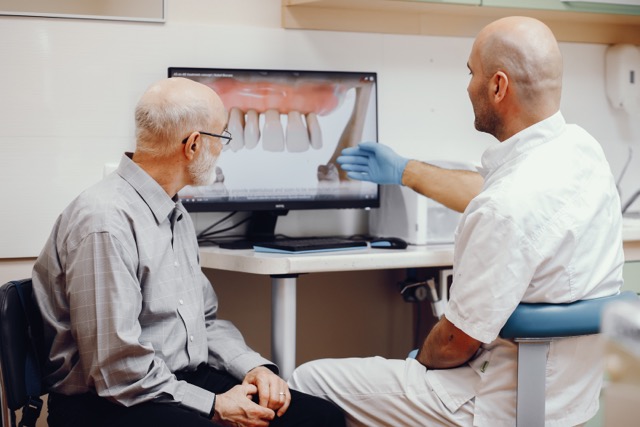Dental Implants for Seniors: Benefits, Risks, and Care

Contents
- 1 What Are Dental Implants and How Do They Work?
- 2 Can Seniors Get Dental Implants?
- 3 Benefits of Dental Implants in the Elderly
- 4 Risks and Considerations for Senior Patients
- 5 How to Care for Dental Implants as a Senior
- 6 Alternative Options to Implants for Seniors
- 7 Frequently Asked Questions About Dental Implants for Seniors

While the human body perpetually regenerates, it seems the signal weakens till it comes to teeth. Tooth deterioration and loss are generally widespread in the golden years. Around 26% of U.S. seniors have 8 or fewer teeth! Modern dentistry offers different methods to reverse this natural process, one of which is dental implants.
What happens to implants when you get old? Do their risks outweigh their benefits? Are they most favorable for senior age? Let’s sort things out!
What Are Dental Implants and How Do They Work?
A dental implant is a screw-shaped artificial tooth root supporting the upper construction part, a dental crown. Though there are different types of dental implants, they are mostly made of titanium alloy. They can restore your ability to eat, chew, and speak comfortably and increase smile aesthetics. Dental implants have a remarkably lasting lifespan, making them the most sought-after option for tooth loss.
Can Seniors Get Dental Implants?
For the elderly, dental implants are a great solution if they have sufficient jawbone density and good overall health. Their effectiveness and success rate are equally high as for younger patients.
Consider several factors that can impact the procedure’s success:
- Health history. Diabetes, osteoporosis, or cardiovascular disease can affect the potential to get dental implants, so share your medical history with an oral surgeon at the initial appointment.
- Jawbone density. The procedure might not suit you in case of insufficient jawbone amount. Some seniors may need bone grafts to ensure that implants properly fuse with the jawbone.
- Recovery time. Given the slower tissue regeneration, the elderly might need more time to heal.
- Smoking. The risk of implant failure is significantly higher among smokers. Discuss it with your doctor and refrain from smoking if possible for the best surgical result.
Dental implants for senior citizens can be a life-changing solution if you follow your doctor’s post-operative instructions and care for them properly.
Benefits of Dental Implants in the Elderly
Dental implants can provide individuals of older age with numerous advantages:
- Restored chewing functionality. Implants enable seniors to chew different foods, including proteins, vegetables, and fruits.
- Comfortable fit. Dental implants are reliably positioned in the jawbone, so they won’t slide or fall out.
- Enhanced confidence in social settings. Implants mimic natural teeth, empowering seniors to more eagerly engage in social interactions.
- Preserved jawbone density. They prevent the jawbone from gradual deterioration, which is inevitable when a tooth is missing.
- Better pronunciation. Even a single lost tooth can promote mumbling and slurred speech. Dental implants contribute to enhanced speech clarity.
- Convenient oral hygiene. Implants are easy to care for, and seniors can brush and floss their teeth as usual.
Dental implants cope with functional implications and enhance oral health, regardless of age. They significantly outperform conventional dentures or bridges in this respect.
Risks and Considerations for Senior Patients
In general, aging isn’t considered a risk factor for osseointegration. Many seniors have chronic health conditions and poor jawbone density, which may impede successful treatment. Let’s examine these considerations more precisely:
- Lasting healing time. Seniors need diligent post-operative care since their recovery period is longer than that of adults.
- Low jawbone integrity. Bone density may decrease with age, especially if a person has been missing teeth for a long time. An insufficient amount of bone tissue increases the risk of implant failure.
- Chronic illnesses. Heart disease, diabetes, and autoimmune disorders can slow healing and enhance the likelihood of infection.
- Adverse effects of medications. Certain medications that manage chronic illnesses, such as diabetes, heart disease, or osteoporosis, may negatively impact the body’s ability to heal.
- Higher possibility of infection. Seniors usually have weakened immune systems, which increases the risk of infections after the implant surgery.
If an older adult wants to get dental implants, they should first address their existing health conditions and take measures to improve immunity.
How to Care for Dental Implants as a Senior
Dental implant care for seniors involves commitment to oral hygiene practices, including:
- Daily brushing and flossing around the implant site;
- Regular professional in-office cleanings;
- Keeping away from harmful habits like smoking;
- Conscious dietary choices, like excluding hard candies or ice from the daily ration.
A comprehensive maintenance routine ensures that dental implants for seniors last as long as originally planned.
Alternative Options to Implants for Seniors
A cumulative implant survival rate of 98.6% explains the popularity of dental implants in the elderly population. If you are not eligible for the procedure, consider these alternatives.
| Implant Alternative | Pros | Cons |
| Dentures | Practical solution for seniors with multiple missing teeth or lack of jawbone density;Removable for cleaning. | Less stable than dental implants;Need adhesives and recurrent adjustments;Don’t avert bone deterioration. |
| Dental bridges | Fixed dental restorations;Prevent the need for invasive surgery;Can replace one or two lost teeth. | Natural teeth are adjusted for bridges support, which affects their strength in the future;Don’t preserve jawbone structure. |
Both options are faster, more affordable, and less invasive than dental implants. However, the latter option offers outstanding stability, visual aesthetic, and jawbone loss prevention. For a more in-depth comparison, read our expert articles, Dental Bridge vs. Implants and Dental Implants vs. Dentures.
Dental implants for pensioners can significantly enhance the quality of life. Their unmatched functionality, durability, convenience, and natural appearance totally justify the cost. If you are interested in this or other tooth restoration solutions, we provide VIP Dental Care at every stage—from the initial consultation to the final polish of your dental investment.
Frequently Asked Questions About Dental Implants for Seniors
How long do dental implants last in older adults?
Denture implants for seniors are designed to be permanent. Their lifespan depends on chronic health conditions, jawbone quality, oral hygiene, food choices, and routine dental check-ups.
How old is too old for dental implants?
We’ve discussed the minimum age for dental implants, but no upper age limit exists. If a senior has good overall health, sufficient jawbone density, and a commitment to take diligent care of their oral cavity, dental implantation may suit them.
Should an 80-year old get dental implants?
It depends on the particular case. Poor health, lack of jawbone density, and certain chronic diseases might impair recovery. Ask a qualified oral surgeon for a thorough dental examination to make an informed decision.
Do seniors need bone grafts for dental implants?
In addition to dental implants, elderly might need bone grafting to restore jawbone tissue that supports implants. It isn’t a must, as sometimes a doctor can use mini implants and other means to ensure the construction stability. Address a credible dental office for an all-encompassing consultation.
Additional Resources
Is old age a risk factor for dental implants? Read recent research by Japanese scholars!













